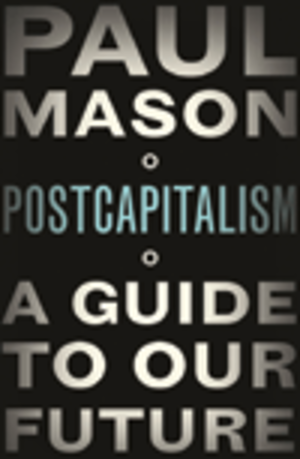Postcapitalism: A Guide To Our Future by Paul Mason
Book review: Postcapitalism: A Guide To Our Future by Paul MasonA thought-provoking work on capitalism, whether you agree with him or not, says Stuart Watkins.

Get the latest financial news, insights and expert analysis from our award-winning MoneyWeek team, to help you understand what really matters when it comes to your finances.
You are now subscribed
Your newsletter sign-up was successful
Want to add more newsletters?

Twice daily
MoneyWeek
Get the latest financial news, insights and expert analysis from our award-winning MoneyWeek team, to help you understand what really matters when it comes to your finances.

Four times a week
Look After My Bills
Sign up to our free money-saving newsletter, filled with the latest news and expert advice to help you find the best tips and deals for managing your bills. Start saving today!


Postcapitalism: A Guide To Our Future
by Paul MasonPublished by Allen Lane, £16.99(Buy at Amazon)
"Capitalism will be over in our lifetime," declares Paul Mason confidently in the opening pages of his new book. If you read no further, you might be forgiven for assuming that you're in for a wearily familiar leftist rant about the evils of capitalism and how it's all doomed to be swept away by a new socialist order, and moving on swiftly. But you'd be wrong to.
MoneyWeek
Subscribe to MoneyWeek today and get your first six magazine issues absolutely FREE

Sign up to Money Morning
Don't miss the latest investment and personal finances news, market analysis, plus money-saving tips with our free twice-daily newsletter
Don't miss the latest investment and personal finances news, market analysis, plus money-saving tips with our free twice-daily newsletter
In fact, if you can look through some of the angry leftist rhetoric and take the broad theoretical framework and wide-eyed techno-optimism with a pinch of salt, you will find much in this stimulating book that you will already be at least familiar with if you are a regular reader of MoneyWeek.
Mason's main task is to look at the causes of our current economic predicament, then to propose some solutions. According to Mason, the world's relative economic stagnation following the 2008 financial crisis can be traced to four factors. The first is fiat money. Printed money and debt has grown faster than the assets or economic growth that once backed it, or could in the future be expected to pay for it. By simply printing more money to deal with the crisis, all we have done is store up a bigger crisis further down the road.
Second, financialisation. Lack of growth in the real economy led workers on stagnant wages to gorge on credit and investors to seek returns in speculation rather than growth. The result is an economy dominated by shysters rather than productive activity.
Third, global imbalances. Globalisation led to rich Western countries outsourcing productive industry to countries with less militant, cheaper workers, and financing consumerism with debt. The result of that was always going to be an imbalanced world: economic booms and savings gluts in the emerging world and trade deficits, high government debts and financial instability in the West.
Finally, information technology. Even as the global economy teetered on the brink of collapse, technological innovation continued at a startling pace. Smartphones and Twitter were all but unknown when the crisis started. Life now is unimaginable without them. Yet that very innovation seems unlikely to result in a new upswing for capitalism, because there is little profit in providing things for free or at ever-reduced cost the very thing these technologies are tasked with doing.
As for Mason's proposed solutions, you'll have read many of them in these pages too. The only way out for indebted governments is some combination of debt write-offs or financial repression (cheapening debt and wiping out savings by stoking inflation, essentially, though Mason is more gleeful about this prospect than we are).
Banking should be simplified and central banking democratised. The state should shrink and the gaps left where states and markets failed filled by voluntary activity. And we must compensate the losers from globalisation and free trade, and those who lose their jobs to the robots perhaps with a universal basic income, paid to all citizens as a right.
Mason sees all this leading to a bright new postcapitalist future. We'd see it as more of a reformed type of capitalism, rather than something entirely new. But this is not necessarily a criticism. Perhaps, as Mason says, our new world and the challenges we face will point increasingly to obvious solutions that transcend old left-right distinctions. Postcapitalism is a book with much bolder ambitions than Mason's previous ones, and it doesn't quite live up to them.
His previous books played to his strengths as a social affairs reporter, whereas this one attempts a bolder theoretical picture which would have to be a lot more rigorous and less journalistic to begin to be convincing to a lay reader, let alone a specialist. That said, he brings a seriousness of purpose to his craft that is sadly missing almost everywhere else. Whether you agree with him or not, you are certain to find his work thought-provoking.
Postcapitalism: A Guide To Our Future by Paul Mason (Allen Lane, £16.99)
Get the latest financial news, insights and expert analysis from our award-winning MoneyWeek team, to help you understand what really matters when it comes to your finances.

Stuart graduated from the University of Leeds with an honours degree in biochemistry and molecular biology, and from Bath Spa University College with a postgraduate diploma in creative writing.
He started his career in journalism working on newspapers and magazines for the medical profession before joining MoneyWeek shortly after its first issue appeared in November 2000. He has worked for the magazine ever since, and is now the comment editor.
He has long had an interest in political economy and philosophy and writes occasional think pieces on this theme for the magazine, as well as a weekly round up of the best blogs in finance.
His work has appeared in The Lancet and The Idler and in numerous other small-press and online publications.
-
 Can mining stocks deliver golden gains?
Can mining stocks deliver golden gains?With gold and silver prices having outperformed the stock markets last year, mining stocks can be an effective, if volatile, means of gaining exposure
-
 8 ways the ‘sandwich generation’ can protect wealth
8 ways the ‘sandwich generation’ can protect wealthPeople squeezed between caring for ageing parents and adult children or younger grandchildren – known as the ‘sandwich generation’ – are at risk of neglecting their own financial planning. Here’s how to protect yourself and your loved ones’ wealth.